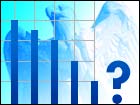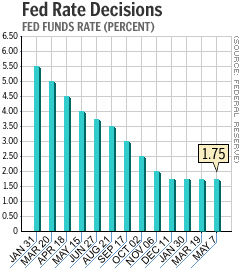
NEW YORK (CNN/Money) -
To hear some economists talk, it would seem the Federal Reserve is in a tough spot as it ends its two-day policy meeting Wednesday.
For one thing, its target for short-term interest rates is as close to zero as it's been in 40 years, flooring the gas on the economy's accelerator. But the economy, like an old clunker on a steep hill, has been slow to respond, raising the possibility that the Fed might have to cut rates yet again.
On the other hand, some economists say all this worry about the economy is only making matters worse, sinking the stock market and consumer confidence, and that the best thing the Fed could do for the economy is declare the downturn over and raise rates as soon as possible.
But maybe the Fed is really in the best of all possible worlds -- the economy is growing, but not fast enough to spur inflation. Slumping stock prices are boosting Treasury bond prices, sending bond yields lower and keeping other interest rates low, stoking the economy without the Fed having to lift a finger.
Meanwhile, a sinking dollar has brought relief to long-suffering U.S. exporters by making their goods competitive overseas, encouraging them to make more goods and, eventually, hire more workers.
"If I were to describe the Fed's position, I'd say it's in the catbird seat," said Lyle Gramley, former Fed governor and now senior economic advisor with Schwab Capital Markets in Washington, D.C. "It's very likely the Fed will sit still as long as possible. We might see enough signs of recuperation that the Fed would move [to raise rates] in September, but there's no chance this week and virtually no chance in August."
Most economists on Wall Street agree with Gramley, according to a recent survey by Reuters, which found that 14 of 22 economists surveyed thought the Fed would leave rates alone until November, and none thought the Fed would cut rates again.
The Fed's announcement is expected to come at about 2:15 p.m. ET Wednesday.
Another cut coming?
But there have been whispers recently that the Fed's position might not be so comfortable. First, Lehman Brothers economists Ethan Harris, Stephen Slifer and Joseph Abate worried in a research note on June 14 that continuing weakness, particularly in the stock market, could lead to another cut.

"What we worry about is that some of the decline in the stock market can spill over and begin to erode confidence," Slifer told CNN/Money on Monday. "If the stock market takes out Sept. 21 lows, people are going to worry that something's wrong -- I can see the headlines -- and I wonder what that will do to people."
"All we're saying is, let's not all be solidly in the camp that says the next Fed move is going to be a tightening move," Slifer added.
On Monday, published reports in the Financial Times and Wall Street Journal said another former Fed governor, Laurence Meyer, was considering the possibility of another rate cut. Though Meyer told CNN/Money he thought another cut was unlikely, he said the slight risk of one couldn't be ruled out.
"I expect the economy to rebound to above-trend growth. We just hit a soft spot in the second quarter," Meyer said. "If it turns out that the economy continues to grow below trend ... if the data continue to be as weak as they have been in the past three months, with a sufficient rise in the unemployment rate, you can't rule [a rate cut] out."
Click for more on the Fed's timing
History would seem to support the cause for another cut -- after the 1990-91 recession ended, the Fed cut rates 10 times, on top of the 10 cuts it made between 1989 and 1991. It kept cutting until September 1992, even after the unemployment rate had fallen from its peak.
But Meyer -- now a senior adviser with Macroeconomics Advisors LLC and a distinguished visiting scholar at the Center for Strategic and International Studies in Washington, D.C. -- said the 1990-92 economy was different in some important ways from the 2000-02 economy, including the fact that the latest unemployment rate, 5.8 percent, is a pretty far cry from a peak of 7.8 percent in 1992.
"We got a lot more growth in the first quarter of 2002 than occurred in the first year after the 1990-91 recession," Meyer said. "The economy grew near 4 percent in the first half of this year. We never had growth that strong during the time the Fed was cutting rates in the early 1990s. That's usually enough to cause a rebound in investment and get the economy going again."
"On the other hand, it's possible the first quarter's growth was just a one-time inventory rebound and that we're now stuck in a range of 1.5-to-2 percent growth. If that continues, it will be much like the early 90s," Meyer said -- though he did not expect that to happen.
The case for a quick hike
Wednesday morning, Fed policy makers began the second day of a two-day meeting to discuss the economy and their target for short-term interest rates, which they cut to encourage spending and raise to fight inflation. In three meetings this year, the Fed has left rates alone, after cutting them 11 times in 2001.
The Fed has held a neutral view of the economy since March, saying risks to the economy were balanced between a risk of weakness and a risk of inflation.
| |
 Related links
Related links
| |
| | |
| | |
|
But it isn't exactly building floats for a victory parade yet. Instead, it's been saying over and over that the strength of the recovery from a recession that began in March 2001 is still uncertain, and some observers have said that uncertainty has dragged Wall Street down, keeping confidence low and the economy weak.
"The biggest problem this economy has is psychological, and that's the biggest problem the market has, too," Putnam Investments economist David Kelly told CNNfn's CNNmoney Morning program.
Kelly's rather radical solution -- which he stressed he did not expect -- would be for the Fed to actually raise rates this week.
"The economy is getting better," Kelly said. "The Fed is the most competent authority to rule on that, to tell investors, consumers and businessmen that this expansion is under way. And I think they should do that."
But the Fed might not be so positive that all is well with the economy, at least not according to the anecdotal evidence it has gathered from business leaders around the country, a critical component of its decision-making process, according to Allen Jacobson, a political analyst with Washington Analysis in Washington, D.C.
"Corporate leaders have indicated to the Fed that, right now, the outlook is murky," Jacobson said. "Long term, the Fed and everybody else is positive. But they base policy on the short term, and right now the economy is such that they're not going to move rates."

|

